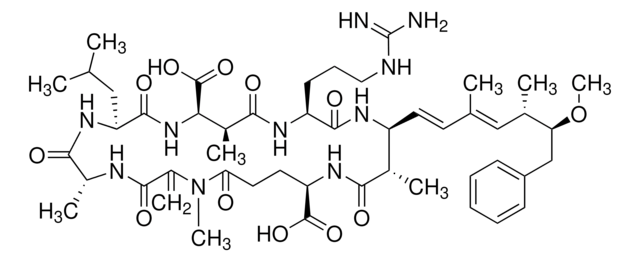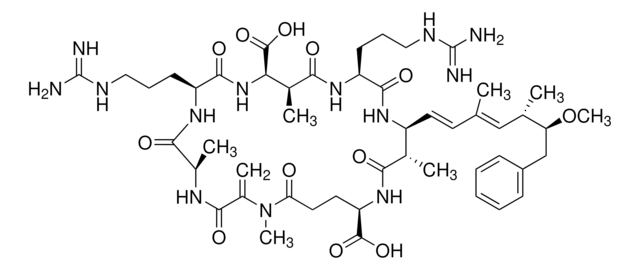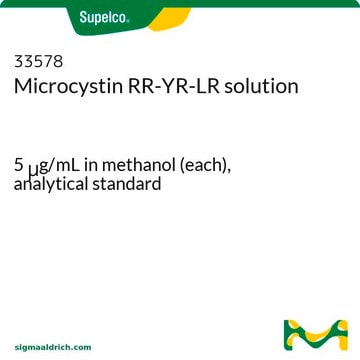475821
Microcystin-LR
from Microcystis aeruginosa, ≥95% (HPLC), liquid, protein phosphatase 2A and protein phosphatase 1 inhibitor, Calbiochem®
Synonym(s):
InSolution Microcystin-LR, Microcystis aeruginosa
About This Item
Recommended Products
product name
Microcystin-LR, Microcystis aeruginosa, InSolution, ≥95%, inhibitor of protein phosphatase 1 (PP1) and protein phosphatase 2A (PP2A)
Quality Level
Assay
≥95% (HPLC)
form
liquid
manufacturer/tradename
Calbiochem®
storage condition
OK to freeze
desiccated (hygroscopic)
protect from light
shipped in
wet ice
storage temp.
−20°C
General description
Biochem/physiol Actions
protein phosphatase 1 (PP1) and protein phosphatase 2A (PP2A)
Packaging
Warning
Physical form
Reconstitution
Other Notes
Nishiwaki, R., et al. 1994. Cancer Lett. 83, 283.
Amick, G.D., et al. 1992. Biochem. J.287, 1019.
Davidson, H.W., et al. 1992. J. Cell Biol.116, 1343.
Nishiwaki-Matsushima, R., et al. 1992. J. Cancer Res. Clin. Oncol. 118, 420.
Cohen, P., et al. 1990. Trends Biochem. Sci.15, 98.
MacKintosh, C., et al. 1990. FEBS Lett.264, 187.
Cohen, P., et al. 1989. FEBS Lett.250, 596.
Carmichael, W.W. 1988. in Handbook of Natural Toxins3,Marine Toxins and Venoms (Tu, A.T., Ed.) p. 121, Decker, New York.
Legal Information
Storage Class Code
10 - Combustible liquids
WGK
WGK 2
Flash Point(F)
188.6 °F - closed cup - (Dimethylsulfoxide)
Flash Point(C)
87 °C - closed cup - (Dimethylsulfoxide)
Certificates of Analysis (COA)
Search for Certificates of Analysis (COA) by entering the products Lot/Batch Number. Lot and Batch Numbers can be found on a product’s label following the words ‘Lot’ or ‘Batch’.
Already Own This Product?
Find documentation for the products that you have recently purchased in the Document Library.
Our team of scientists has experience in all areas of research including Life Science, Material Science, Chemical Synthesis, Chromatography, Analytical and many others.
Contact Technical Service






